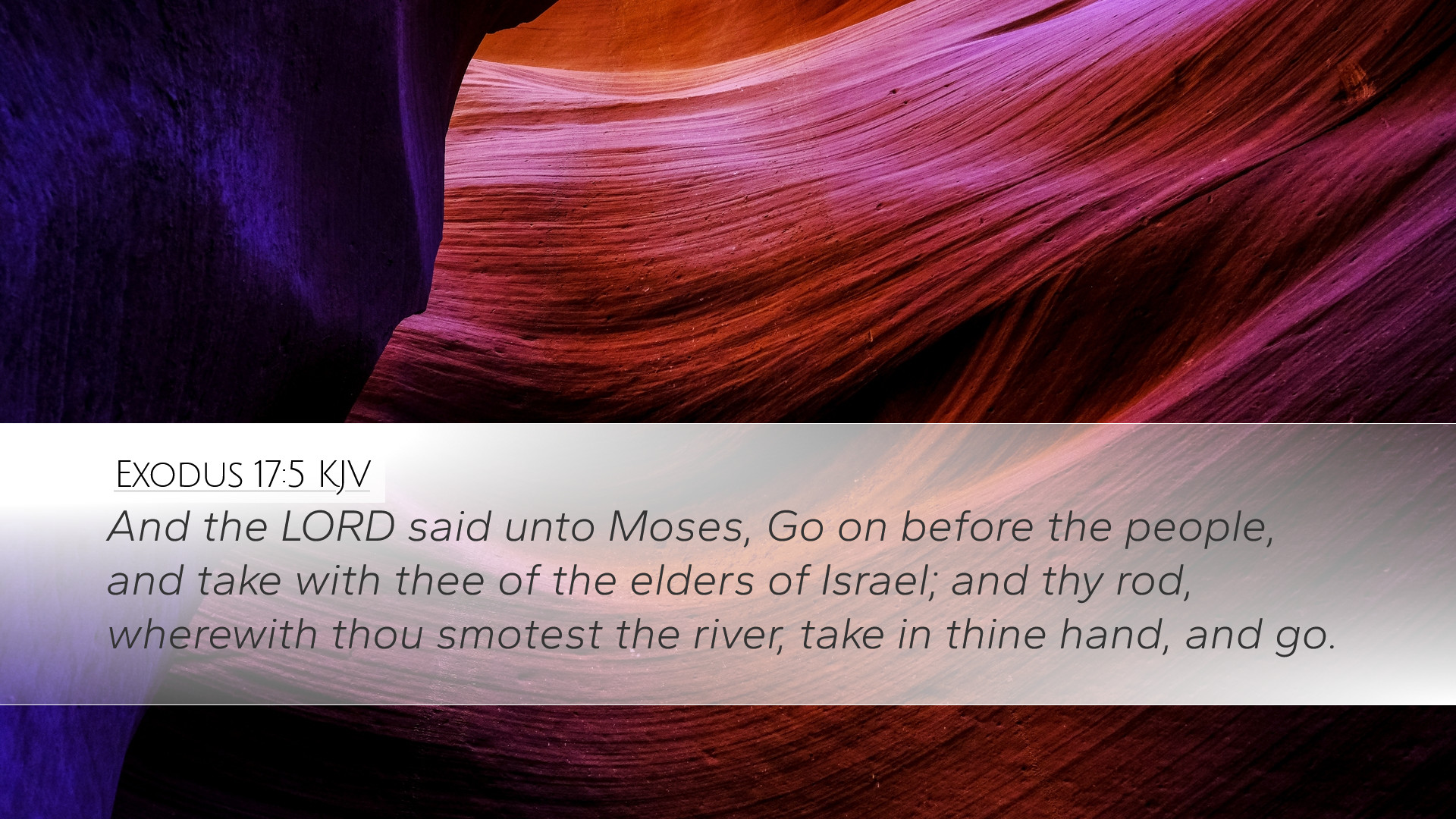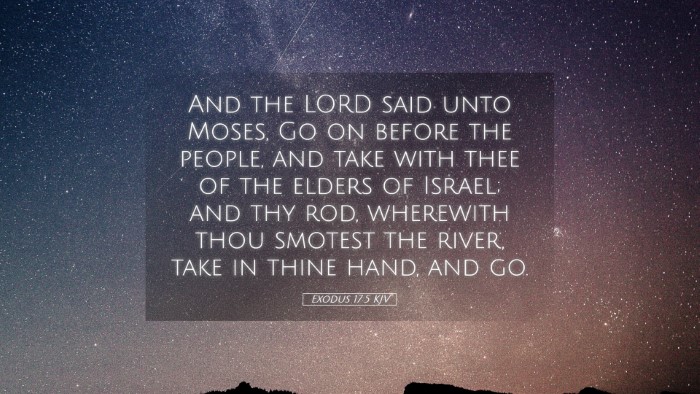Commentary on Exodus 17:5
Introduction
Exodus 17:5 captures a significant moment in the journey of the Israelites through the wilderness, illustrating God's providence and their need for obedience. This verse is pivotal in understanding both the historical context of the Exodus and its theological implications for believers today.
Textual Analysis
Exodus 17:5 reads: "And the LORD said unto Moses, Go on before the people, and take with thee of the elders of Israel; and thy rod, wherewith thou smotest the river, take in thine hand, and go." This directive from God to Moses is rich in meaning and significance.
Divine Instruction
The command given to Moses demonstrates God's ongoing guidance and leadership. He tells Moses to go before the people, which signifies that God is not only a deliverer but also a guide. This is a theme prevalent in biblical narratives, where God's guidance often comes at critical junctures.
Role of the Elders
Moses is instructed to take the elders of Israel with him. Their involvement is vital as it indicates the communal aspect of receiving God's provision. The elders represent the leadership of Israel, and their presence enhances the legitimacy of Moses' actions, reflecting the collective responsibility of the Israelite community in their journey of faith.
The Rod as a Symbol
The rod mentioned in this verse holds significant symbolic weight. It is a representation of God’s power and the authority entrusted to Moses. Through this rod, miraculous events had already taken place, such as the plagues in Egypt. The repetition of this object reinforces the idea that God’s chosen instruments are often ordinary yet marked by divine power.
Theological Implications
Exodus 17:5 provides deep insights into God’s character and His relationship with His people. The following points illustrate key theological themes:
- God's Faithfulness: God continuously provides direction and assistance, showing His commitment to His covenant people.
- Leadership and Obedience: The roles of Moses and the elders underline the importance of leadership that is submissive to divine authority while also communal in its approach.
- Divine Power in Human Weakness: The rod, a simple shepherd’s tool, signifies how God often uses the seemingly weak and insignificant to manifest His might.
Insights from Commentaries
Matthew Henry's Commentary
Matthew Henry emphasizes that this passage showcases the miraculous provision of God in times of need. He notes that God often prepares His servants for service through trials, thus shaping their character and reliance upon Him. The request for the elders to accompany Moses highlights the importance of communal faith; the miracles performed were not solely for Moses but involved the larger community.
Albert Barnes' Notes on the Bible
Albert Barnes notes that the elders’ presence emphasizes the authority in leadership. The act of taking the rod signifies a call to remembrance of God's past miracles. Barnes suggests that this incident illustrates the principle that one must act in faith on what God has already done—the rod that divided the waters now serves to obtain water for the people.
Adam Clarke's Commentary
Adam Clarke highlights the obedience required of Moses in this directive. He points out that God's instructions may seem perplexing or inadequate at times, yet they must be followed with confidence in God’s plan. Clarke also discusses the symbolic significance of the rod as a tool of salvation, framing this event within the broader narrative of God's deliverance and care for His people during their arduous journey.
Application for Pastors and Theologians
Exodus 17:5 invites reflection on leadership and obedience within faith communities. Pastors can draw from this text to teach about God’s guidance and the importance of collective leadership. It emphasizes that God calls individuals to act with the support of the community, reminding us that our faith is not a solitary journey but a communal one.
Theologically, this passage can be explored in relation to God’s continuous provision and faithfulness. It raises questions about how God equips His leaders and how communities should respond to divine direction.
Conclusion
In conclusion, Exodus 17:5 serves as a profound reminder of God's sustaining presence and guidance in the lives of His people. Through Moses and the elders, we see a template for leadership rooted in obedience, communal faith, and the recognition of divine authority. As believers, we are called to trust in God's direction and to support one another in our spiritual journey.


